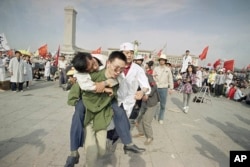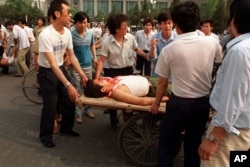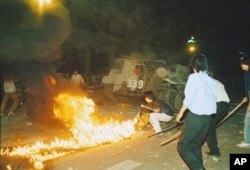Each student killed in Tiananmen Square had a mother.
Over the past three decades, many of these women emerged as activists. Known collectively as the Tiananmen Mothers, they channel their grief over the events of June 4, 1989, into pushing the Chinese government for a full accounting of the events that left hundreds, perhaps thousands, dead in protests which began April 16, 1989, as mourners gathered in Beijing's Tiananmen Square the day after the death of reformer Hu Yaobang, a one time Communist Party leader.
VOA Beijing correspondent Yibing Feng spoke with two of the women as authorities tightened surveillance of them in the run-up to the 30th anniversary of the so called “June 4th incident.” Their remarks have been condensed and edited for clarity.
One of the group’s founders, 83-year-old Ding Zilin, was unreachable. Her son, 17-year-old Jiang Jielian, died in the crackdown. Several weeks ago, authorities had her leave Beijing for her hometown of Wuxi, where both her landline and mobile phone were deactivated.
***
Zhang Xianling spent the night of June 3 worrying. She worried into the next day. Her son, Wang Nan, had ventured to Tiananmen Square early in the protests. Wang was intent on photographing the scene. At first “he told me, ‘Mom, I don’t understand what they’re talking about,' ” she recalled, adding that as he spent more time documenting the students, he came around to their position, seeing it as “for the country.”
Zhang cautioned her son, urging him to stop going to the square. “I said, ‘The student movement will be suppressed … sooner or later.’ … He said the student movement was a driving force for social progress. He told me I was conservative.”
Wang “was moved by the students’ passion," his mother remembered.
On the evening of June 3, Zhang heard from people she knew that soldiers would shoot at the students. She heard from others they would not shoot.
“He promised me, he said ‘I will not go out tonight.’ Usually, he is an obedient child… ” she said.
Soldiers ordered to quash what the government at the time called counterrevolutionary riots opened fire on Tiananmen Square early on June 4.
On June 12, Zhang learned the Huguosi Hospital of Traditional Chinese Medicine had the body of a young man. “There was no room in the morgues of bigger hospitals,” she recalled, adding a doctor told her the body had been found buried in the square with two others.
Wang had been shot in the head, which was wrapped in bloodstained bandages. “I had doubts at the time,” she said because to her the bandages indicated somebody had tried to save her child.
Zhang began making inquiries. She began meeting others doing the same thing, people who also had physical evidence.
Months later “probably in December, or in January 1990,” she said she discovered the student was one of many from Beijing University’s medical school who entered the square behind the troops. Zhang learned troops had threatened the medical students who were attempting to tend to the wounded, blocking them and ambulances from the square. Eventually, she said she pieced together some of what had happened to her son.
Wang was shot at 1 a.m. and died two hours later. “He was only 19 years old,” Zhang said. “It makes me sad every time I say that.”
***
You Weijie connected with Zhang, who placed a big picture of her son in Wan’an Cemetery.
You left a note for Zhang, saying her husband, Yang Minghu, had been killed.
***
You said she didn’t hear the gunshots that night, but her husband did. Yang pedaled away on his bicycle to find out what was going on.
“Beijing didn’t sleep that night, so many people were on the [main] road,” You said, recalling that she waited on the street, heard shots at 3 a.m., and went home to wait.
“I got up to the road at 6 in the morning and waited for him (her husband),” You recalled. When she returned home, a young man was inside. After telling her the door had been unlocked, he told her Yang was wounded and in Tongren Hospital.
The young man told her that he had been in Chongwenmen, which was filled with crowds, because he was too afraid to go to Tiananmen.
“He told me he saw a car crammed with seven people … only two people were still alive. One was my husband,” You said.
She went to the emergency room, which was full of wounded people. From there, she went upstairs to the surgical floor, where a doctor told her Yang’s bladder and pelvis had been seriously damaged. When she began to ask Yang for details, the doctor told her Yang needed to rest.
“I did not think that two days later he would be dead,” she told VOA.
On June 5, Yang needed blood, but because authorities said blood was reserved for injured soldiers, You found herself on the street looking for donors. A doctor helped her.
“Many citizens stood up to donate blood to my husband,” You said. “The public was eager to donate blood to the wounded.”
The couple spoke quietly of their child. Yang wanted a bath and he wanted to eat. When the doctor said Yang could not eat, You focused on how she would coax her husband back to strength once he returned home. “I thought of Yunnan Baiyao [a traditional medicine for bones and joints] and chicken soup,” she said.
On June 6, when You returned to Yang’s side, “Someone gave me a basin of cold water. It hit me, he has passed away.”
She washed her husband of six years, a man she married when he was 36 and she was 30. She cried, and washed him “until I couldn’t wipe anymore. Others took over.”
You still finds it “difficult to accept that people were stabbed with bayonets,” referring to a saying that means inflicting harm on others. “I really can’t accept that the army of my country would do that to my fellow citizens. This is too much for me because we’re not at war, this is unacceptable.”







